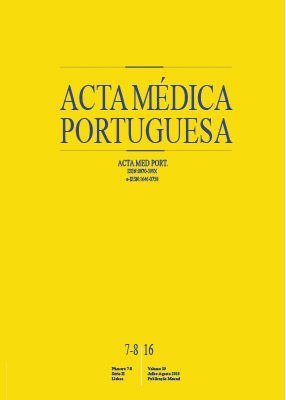Infectious Postpartum Sacroiliitis: The Importance and Difficulty of Early Diagnosis
DOI:
https://doi.org/10.20344/amp.7062Keywords:
Arthritis, Infectious/diagnosis, Hematoma, Epidural, Spinal, Postpartum Period, Sacroiliac Joint.Abstract
The sacroiliitis accounts for about 1.5% - 10% of all cases of septic arthritis and it is strongly associated with gynaecological infections, pelvic trauma or drug abuse (3.4% - 12.8% of cases occur during the postpartum period). Early diagnosis is difficult because the symptoms are nonspecific in pregnancy and in the postpartum period, making the delay of treatment a serious risk of irreversible damage to the joint and development of post-infectious complications. The authors describe the case of a 37-year-old puerperal woman presented to hospital, weeks after urgent caesarean section, with endometritis, post-anesthetic epidural hematoma and secondary infectious postpartum sacroiliitis. The diagnosis of sacroiliac joints pathology during pregnancy and puerperium is challenging. The pathogenesis of infectious sacroiliitis results from local contamination by contiguous infection or hematogenous spread of bacterial infections. The prognosis is usually favorable and depends on early diagnosis and treatment.
Downloads
Downloads
Published
How to Cite
Issue
Section
License
Copyright (c) 2016 Acta Médica Portuguesa

This work is licensed under a Creative Commons Attribution-NonCommercial 4.0 International License.
All the articles published in the AMP are open access and comply with the requirements of funding agencies or academic institutions. The AMP is governed by the terms of the Creative Commons ‘Attribution – Non-Commercial Use - (CC-BY-NC)’ license, regarding the use by third parties.
It is the author’s responsibility to obtain approval for the reproduction of figures, tables, etc. from other publications.
Upon acceptance of an article for publication, the authors will be asked to complete the ICMJE “Copyright Liability and Copyright Sharing Statement “(http://www.actamedicaportuguesa.com/info/AMP-NormasPublicacao.pdf) and the “Declaration of Potential Conflicts of Interest” (http:// www.icmje.org/conflicts-of-interest). An e-mail will be sent to the corresponding author to acknowledge receipt of the manuscript.
After publication, the authors are authorised to make their articles available in repositories of their institutions of origin, as long as they always mention where they were published and according to the Creative Commons license.









